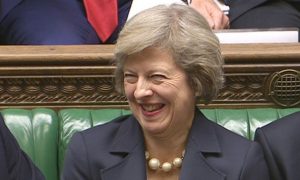How much longer?
 Brexit was always expected to be a divisive topic. It has been ever since David Cameron was scared into allowing legislation for a binding referendum to be included in the Conservative Party Manifesto for the 2015 General Election.
Brexit was always expected to be a divisive topic. It has been ever since David Cameron was scared into allowing legislation for a binding referendum to be included in the Conservative Party Manifesto for the 2015 General Election.
Defeat in that election has been almost a “Godsend” to opposition parties as they have been able to sit back and watch the Government, which is split between remainers and brexiteers fall apart in a never before seen manner.
This weekend two prominent Brexit supporting Ministers drove a further stake figuratively into the heart of Prime Minister Theresa May, openly criticizing the Chancellor of the Exchequer (Finance Minister) for not being prepared for a hard Brexit.
The possibility of a hard Brexit has been raised further since the stalemate continued at the fifth stage of talks between the EU and U.K. with neither side able or willing to break the deadlock.
Mrs May also received the news that the number of rebel Members of Parliament from her Party who want a leadership challenge has now reached forty, just eight short of the number required by the Party’s rules. A challenge before Christmas is now a real possibility particularly as the Brexit Bill is back before Parliament this week with several rebel MP’s looking to side with the opposition to thwart many of the measures being proposed.
Barnier on the Offensive
 Michel Barnier the EU Chief negotiator is a suave, sophisticated Frenchman, so when he makes threats, they are delivered in a calm, almost chilling manner which add to their weight and believability. When he said, over the weekend, that the EU is preparing contingency plans for the collapse of Brexit talks, he is therefore likely to not only be believed but his words will encourage action.
Michel Barnier the EU Chief negotiator is a suave, sophisticated Frenchman, so when he makes threats, they are delivered in a calm, almost chilling manner which add to their weight and believability. When he said, over the weekend, that the EU is preparing contingency plans for the collapse of Brexit talks, he is therefore likely to not only be believed but his words will encourage action.
British businesses awaiting some clarity from the Government over what they can expect from Brexit will now start to prepare for the worst as the relatively simple move to stage two of the talks where the future relationship will be discussed will be moved to March at the earliest. That will give legislators just twelve months to prepare the ground for what is now becoming less and less likely to be a smooth transition.
The weekend also saw unrest in some EU member states as National Days, Remembrance and Politics all merged to bring people onto the streets in Poland and Italy. Since there is an election in Italy next year where the release of a new domestic currency to rival the Euro will be an issue Brussels will be concerned at any further demonstrations of nationalism.
Error, group does not exist! Check your syntax! (ID: 4)
Inflation data to confirm growing Monetary divergence
 FOMC member Patrick Harker has said in a speech that he has “pencilled in” a hike next month and three in 2018 but wants to be convinced by the path for inflation before making a final decision. He believes that inflation needs to be close to 2% before the Fed. starts to actively tighten monetary policy.
FOMC member Patrick Harker has said in a speech that he has “pencilled in” a hike next month and three in 2018 but wants to be convinced by the path for inflation before making a final decision. He believes that inflation needs to be close to 2% before the Fed. starts to actively tighten monetary policy.
Inflation data is due for release in the U.S. and Eurozone this week as well as in the U.K. where advance guidance has already shown that it will exceed 3%.
In the U.S. a few FOMC members besides Harker have been voicing concerns that an economy which is still receiving a high degree of support in the shape of a ballooning of the Fed’s balance sheet is not suffering higher inflation. They are therefore concerned that as rates are raised inflation will fall further. It is expected that the headline CPI number, released on Wednesday will be unchanged at 1.7%
Inflation data in the Eurozone for individual members as well as collectively will be released. ECB President Mario Draghi has been clear that he sees no reason to even discuss monetary policy while inflation across the entire region is as low as 1%. Even Germany is likely to see low inflation despite the way in which their economy is expanding with the industrial powerhouse seeing prices rising by just 1.5% in October.








![Reltex Group Reviews: Explore business opportunities by Trading [reltexg.com]](https://comparic.com/wp-content/uploads/2023/12/image001-218x150.jpg)
![Mayrsson TG Reviews: Why Choose Crypto-Trading with Them? [mayrssontg.com]](https://comparic.com/wp-content/uploads/2023/12/image1-218x150.jpg)








